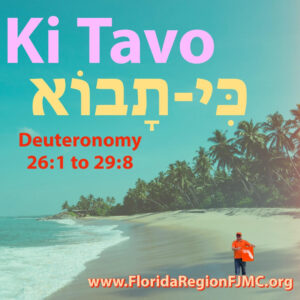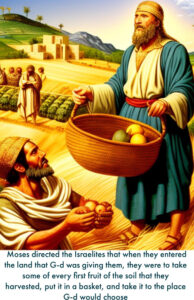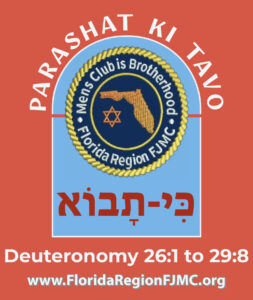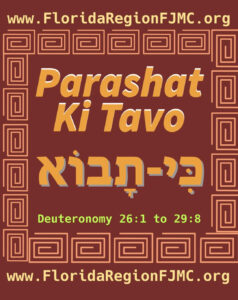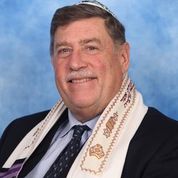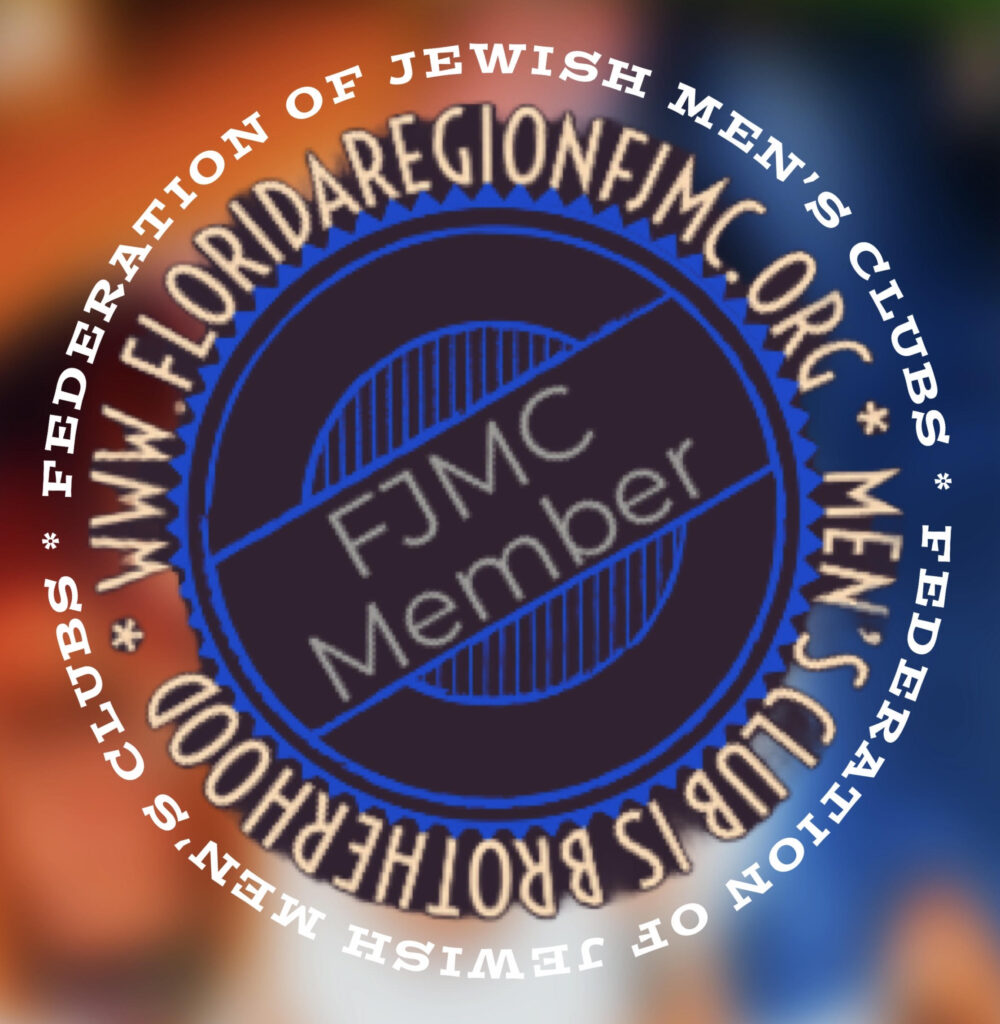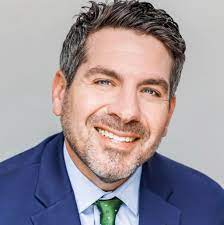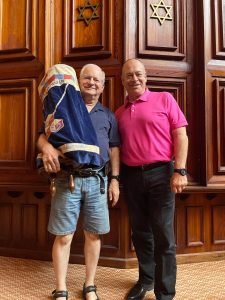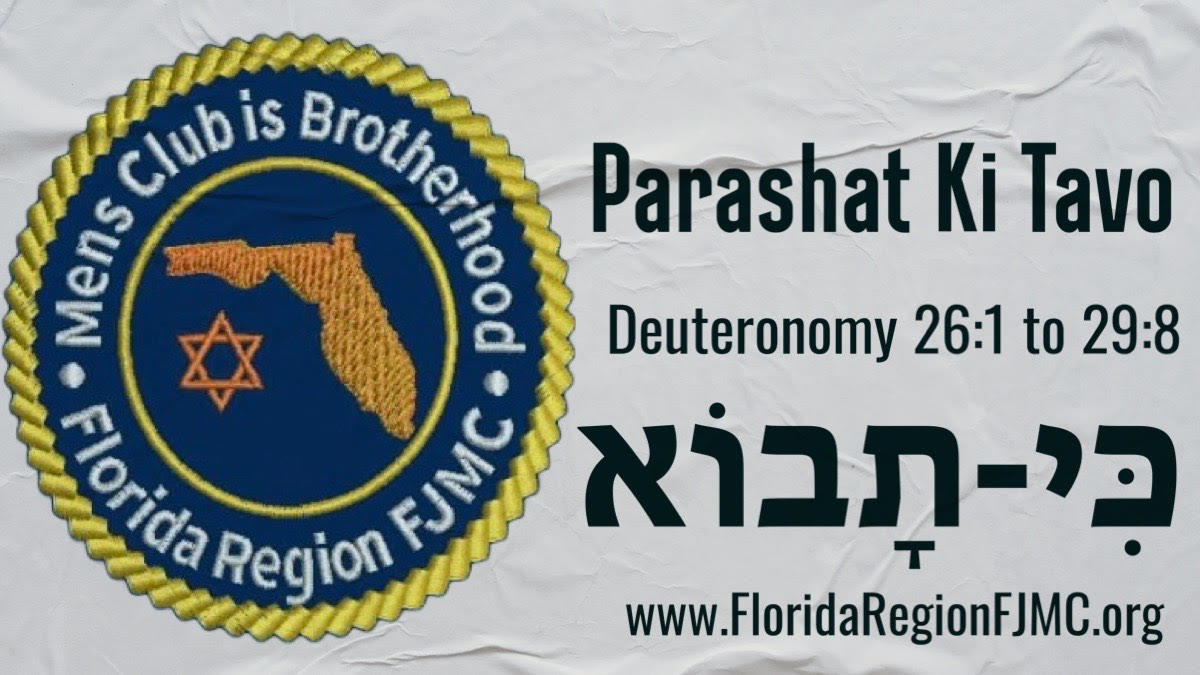
When you Choose Shabbat, you choose to learn that every Shabbat is different and special. This week I learned about Parashat Ki Tavo (כִּי-תָבוֹא), the 50th weekly Torah portion in the annual cycle of Torah readings.
According to Wikipedia, Ki Tavo (כִּי-תָבוֹא), Deuteronomy 26:1 through 29:8, contains 6,811 Hebrew letters, 1,747 words, 122 verses and makes up 261 lines of the Torah scroll. Ki Tavo includes a discussion of the ceremony of the first fruits, bikkurim (בִּכּוּרִים), the law of tithes and a list of blessings for observance of the law and and curses for violation of the law..
Rabbi Michael D Klein of Temple Torat Emet offers his insights on this week’s Torah reading, Ki Tavo for Shabbat September 21, 2024 aka 18 Elul 5784:
“Did you notice that these Sidrot all begin with action words? Ke Tetze, last weeks Sedra begins with, “when you go out”. This week we begin with Ki Tavo- “when you come in”. This is followed by Nitzavim (when you are gathered) and Vayelech (when you go away).
What is the meaning of all these words? The Torah is not just about study and learning although this is an integral component of being faithful to G-d. The Torah is about action! We must take charge of our words and deeds and direct all our efforts toward fulfilling the Mitzvot with every activity. This is a larger iteration of the Shema- “when you sit in your house or when you walk by the way, when you lie down and when you rise up”. Every waking hour and even the mundane activities which we perform can be blessed with elements of holiness and G-dliness. When we go on a journey, we say Tefilat Haderech to ask for safe travels. When we go to sleep, we say the nighttime blessings so that we have no evil dreams, and our Neshama is restored to us upon waking. When we wake, we say Modeh Ani, to thank G-d for restoring our soul and then we recite the Berachot and Shema to ask G-d’s blessings on all the tasks we hope to accomplish that day.
Being a Jew, believing in G-d, studying and learning the laws of the Torah is about action. We must put into action all our beliefs otherwise they are only theoretical ideals.
As we come to the conclusion of the year, and the Torah readings at the end of Sefer Devarim, let us take time to redirect our actions for the coming year so that our lives become happier and more fulfilling for ourselves and our loved ones and so that our actions in fulfilling Mitzvot speak as loudly as our words.”
Questions to Ponder:
- Ki Tavo begins with a ceremony of Thanksgiving. Why does Moses choose this Sedra to emphasize this?
- Ki Tavo also contains an expansion of the Tochecha-the warnings. Why does Moses include this section at this point?
- Why did the ceremony of Thanksgiving become incorporated into the celebration of Shavuout?
- In modern times, how do we show our thankfulness for all the blessings we receive?
Rabbi Michael D. Klein attended Yeshiva College of South Florida and served as Torah Reader, Hebrew teacher, Chazzan and spiritual leader of various synagogues throughout South Florida. In January 2015 he became Ritual Director, Bnai/Bnot Mitzvah instructor and 7th grade Hebrew instructor for Temple Torat Emet of Boynton Beach. In October 2019 he was accepted into an accelerated track and received his smicha from Yeshiva Adath Wolkowisk and has been the Rabbinic leadership of Temple Torat Emet since August 2020. In September of 2022 he was appointed Rabbinic and Spiritual Advisor of the Florida Region of FJMC.
Choose Shabbat; choose to celebrate, to light candles, sing songs and learn a little Torah.
This moment of Jewish Learning is brought to you by the Florida Region of the Federation of Jewish Men’s Clubs (FJMC). We serve the needs of affiliated Men’s Clubs and Brotherhoods throughout the State of Florida. Learn more about the FJMC Florida Region and our growing network of Jewish Men’s Clubs and Brotherhoods at: www.floridaregionfjmc.org and please visit & LIKE our Facebook Group at: www.facebook.com/FloridaRegionFJMC.
The FJMC is a confederation of over 200 Jewish Men’s Clubs and Brotherhoods representing over 20,000 members across the United States, Canada, Latin America, and beyond. Learn how YOUR Jewish Men’s Club or Brotherhood can affiliate with the FJMC at: https://fjmc.org/for-clubs/affiliating-with-the-fjmc/.
